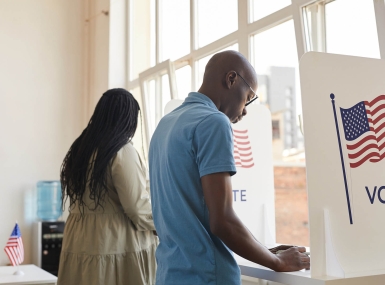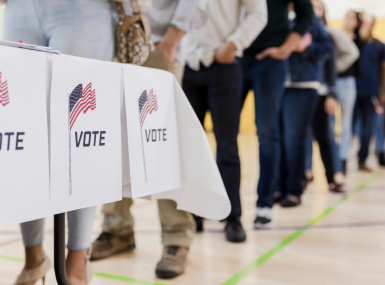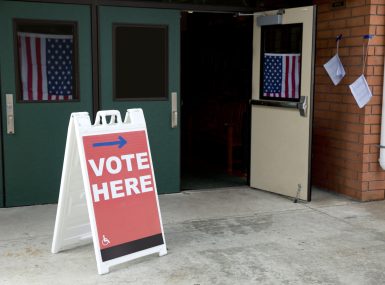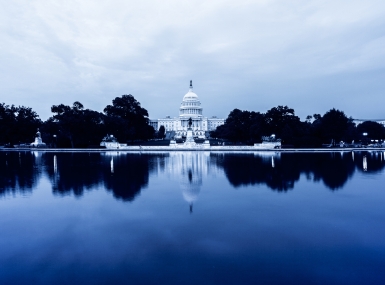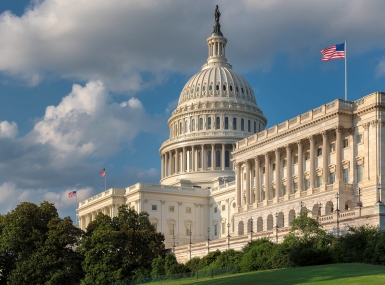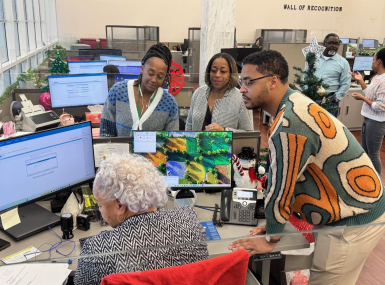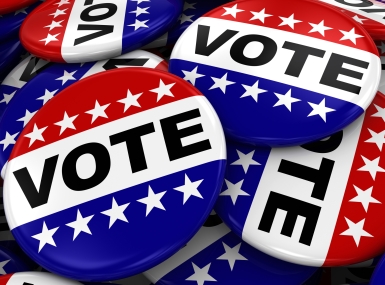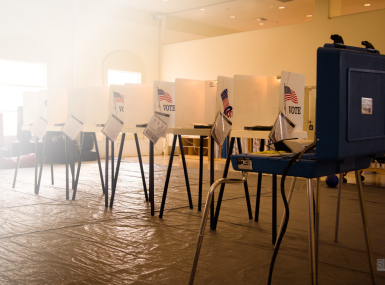Legislative Analysis for Counties: Sustaining Our Democracy Act

Author

Paige Mellerio
Upcoming Events
Related News
On May 18, U.S. Senate Rules Committee Chair Amy Klobuchar (D-Minn.) and Sen. Elizabeth Warren (D-Mass.) introduced the Sustaining Our Democracy Act (S. 4239) to establish a new Democracy Advancement and Innovation Program that would make payments to state and local governments to improve the administration of elections and access to voting. Companion legislation (H.R. 7992) has been introduced by a group of Democratic lawmakers in the U.S. House of Representatives, led by Rep. Nikema Williams (D-Ga.). This legislation takes a major step in allocating funds directly to county governments to support election administration, a top priority for counties and local election officials across the country,
The Sustaining Our Democracy Act follows a series of election reform and voting rights bills introduced in the 117th Congress. This analysis provides an overview of key provisions included in S. 4236/H.R. 7992 and how they may impact county governments.
The nation’s 3,069 counties traditionally administer and fund elections at the local level, including overseeing polling places and coordinating poll workers for federal, state and local elections. County election officials work diligently with federal, state and other local election officials to ensure the safety and security of our voting systems. County election officials strive to administer elections in a way that is accurate, safe, secure and accessible for all voters.
Key Highlights
- Establishes a Democracy Advancement and Innovation Program that would allocate federal funds to each state to carry out “democracy promotion activities”
- Requires a state to submit plans on how it intends to spend these funds and outline how funds will be allocated to political subdivisions, including counties, to carry out these activities
- In cases where states do not submit these plans, counties can submit their own plans and be allocated a portion of these funds
- Once a state’s plan is approved, the U.S. Election Assistance Commission would distribute funds directly to local election administrators for activities that state plans intend to be administered by local government
Overview of Provisions
The legislation would create a new Office of Democracy Advancement and Innovation to oversee the bill’s Democracy Advancement and Innovation Program. The Office of Democracy Advancement and Innovation would operate as an independent agency within the Executive Branch but would work in consultation with the U.S. Election Assistance Commission (EAC) to administer the program.
The program would be implemented as follows.
Democracy Advancement & Innovation Program
The Democracy Advancement and Innovation Program established by S. 4236/H.R. 7992 would allocate funds to all 50 states to carry out democracy promotion activities. The bill would appropriate $2 billion for Fiscal Years (FY) 2023-2032 for a State Election Assistance and Innovation Trust Fund to fund the administration of the Office of Democracy Advancement and Innovation and the Democracy Advancement and Innovation Program.
The legislation describes democracy promotion activities eligible for funding as:
- Activities to improve efficiency in the administration of federal elections and to secure the infrastructure used in these elections. This includes upgrades to voting equipment and voter registration systems, voter registration and nonpartisan voter outreach activities, voting location security, expansion of polling places, the availability of early and mail voting and the promotion of cybersecurity.
- Activities to recruit, train and retain nonpartisan election officials and poll workers.
- Activities to protect election officials from threats and intimidation while administering Federal elections.
- Activities to increase access to voting in federal elections for underserved communities, individuals with disabilities, racial and language minority groups, individuals entitled to vote by absentee ballot under the Uniformed and Overseas Citizens Absentee Voting Act and voters residing on tribal lands.
State Plans For Use of Funds
In order to receive funds, the chief state election official, in consultation with majority and minority party leaders of each house of the state legislature, must submit plans to the Office of Democracy Advancement and Innovation outlining how their state intends to use these funds no later than 90 days prior to the start of the federal fiscal year on September 30. Each plan would be required to detail how funds will be allocated to political subdivisions in the state, including counties, to carry out the democracy promotion activities described above. The Office of Democracy Advancement and Innovation would then have until 45 days prior to the beginning of the fiscal year to determine, in consultation with the EAC, whether the plan is deemed acceptable to receive funding. If the plan is rejected, the bill provides a process by which a recipient can revise its plan to meet the program’s requirements.
If a state fails to submit a plan, each political subdivision within a state, including counties, would be treated as a state. In this case, the executive official charged with the administration of elections within the county would be responsible for submitting a plan on the first day of the fiscal year. The Office of Democracy Advancement and Innovation and EAC would then have 30 days after the beginning of the fiscal year to decide whether the county’s plan is satisfactory for funding. The county would not be required to consult with the state legislature in developing these plans.
Amount of Allocation
S. 4236/H.R. 7992 would charge the EAC with distributing Democracy Advancement and Innovation Program funds. The amount of the total allocation for each state would equal the congressional district allocation amount (outlined below) multiplied by the number of congressional districts in the state for the next regularly scheduled general federal election.
The congressional district allocation amount is equal to the total funding available for the program in a fiscal year divided by the total number of congressional districts in all states (currently 435). The bill appropriates $2 billion over 10 years and using the formula and appropriations instructions in the bill, this would result in a Congressional district allocation amount likely over $4 million per district over this time span.
Although the state would be responsible for producing and submitting its plan, funds would be disbursed directly from the EAC to local election officials with respect to amounts related to activities listed in the state plan carried out directly at the local level. Since counties administer elections at the local level, much of these funds would be distributed directly to counties.
In the case that a county submits a plan to the Office of Democracy Advancement and Innovation because the respective state failed to do so, the county would be allocated the sum of the proportional amount of funds based on the county's population versus the population of the state plus the proportional amount of unsubscribed funds (those that would have went to counties that did not submit their own funds) based on the county's population versus the population of all the counties that submitted plans in the state.
Direct County allocation= subscribed funds x (county population/state population) + unsubscribed funds x (county population/population of all counties in the state that submitted plans)
Prohibited Use of Funds
The bill lays out specific activities for which these funds cannot be used. These activities include:
- Activities that intimidate, threaten, or coerce voters, poll works, or election administrators.
- Restricting the distribution of food or nonalcoholic beverages to voters while waiting at polling places. This excludes restrictions on distributions made on the basis of the electoral participation or political preference of the recipient.
- Removing election administrators from their positions other than for negligence, neglect of duty, or malfeasance in office.
- Defending against lawsuits alleging voter-suppression practices or proposed practices.
- Investigations of claims of voter fraud based on the mere invocation of interests in voter confidence or prevention of fraud.
- Audits that (1) fail to meet EAC’s best practices, (2) fail to meet the requirements for record retention under title III of the Civil Rights Act of 1960 and (3) otherwise jeopardize election records, voting equipment, electronic poll books, or election management systems.
- Removing voters from voter rolls based on evidence that is not reliable.
- Activities that prevent individuals seeking to have their right to vote or register to vote restored.
- Purchasing of voting machines that do not require the use of individual voter-verifiable paper ballots marked through the use of a non-tabulating ballot marking device or system.
County Impact
Counties support a consistent, predictable and dedicated federal funding stream to assist counties with meeting the significant federal requirements already imposed on local governments administering elections. Federal funding dedicated to election administration should be administered in coordination and in consultation with local governments, including an assurance that a portion of the funding be made available to the discretion of local governments. A consistent federal funding stream would allow counties to prepare for future technology and security updates, recruit, train and retain high-quality individuals that administer elections, as well as to provide continued access to voters that have challenges as required by existing federal laws such as the Voting Rights Act and Uniformed and Overseas Citizens Absentee Voting Act (UOCAVA).
Under S. 4239/H.R. 7992, funding would be delivered directly to counties based on the expenditures itemized in their respective state’s plan submitted to the EAC. Additionally, counties would still be able to receive direct funding from the EAC if their respective states fail to submit a plan.
Additionally, NACo strongly supports the role and functions of the EAC and appreciates the important role the EAC plays in coordinating collaborative efforts among local, state and federal government officials in addressing issues associated with the field of election administration. The independent Office of Democracy Advancement and Innovation that would be established under S. 4239/H.R. 7992 would be charged with administering the Democracy Advancement and Innovation Program in collaboration with the EAC, which would also maintain its authority to distribute election funding to state and local governments. Counties would be concerned with and oppose any potential efforts of the Office of Democracy Advancement and Innovation to issue guidelines and requirements related to election administration and voting machines, systems and the certification separate from those of the EAC.

